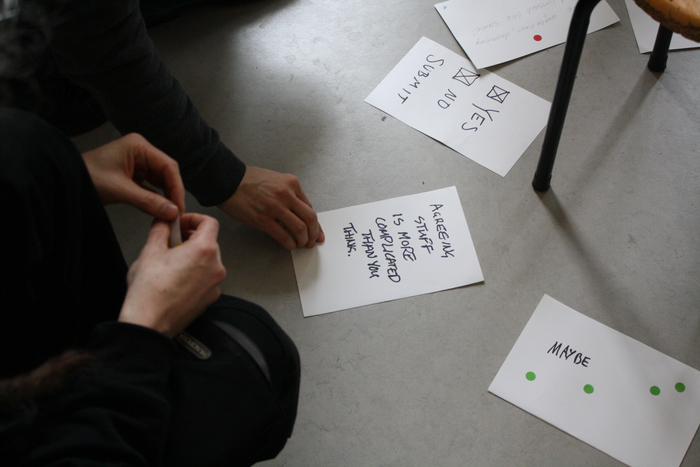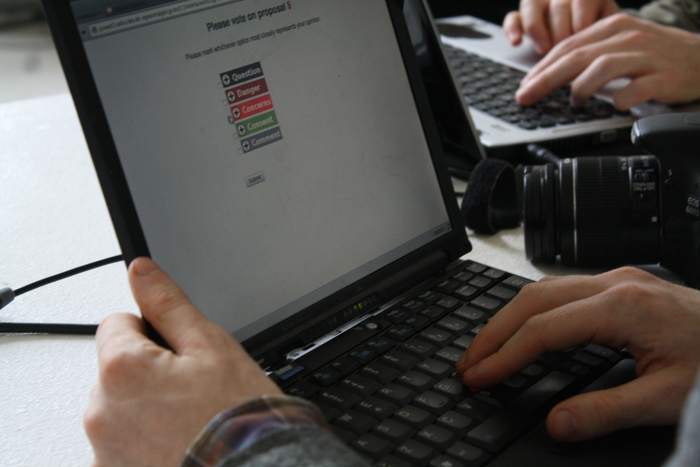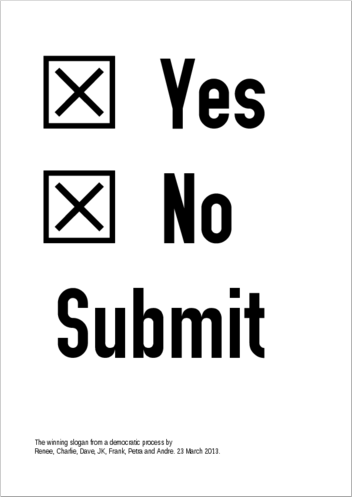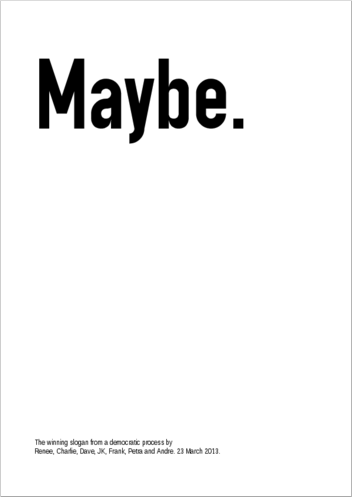User:Eleanorg/Eleanor Greenhalgh, Graduation Project, Trimester 5, 2013: Difference between revisions
No edit summary |
|||
| (9 intermediate revisions by the same user not shown) | |||
| Line 4: | Line 4: | ||
Consent? is a research project into the role and meaning of consent in collaborative publishing. It aims to create tool/s for collaborative document curation which highlight the dilemmas of working together consensually: what does agreement mean, how is it produced and encoded, and how could a process of reaching consent be reflected in the printed outcome? | Consent? is a research project into the role and meaning of consent in collaborative publishing. It aims to create tool/s for collaborative document curation which highlight the dilemmas of working together consensually: what does agreement mean, how is it produced and encoded, and how could a process of reaching consent be reflected in the printed outcome? | ||
In Trimester 5 the project was developed conceptually through face to face research with feminist activists, into radical meanings and practices of consent. This research was then applied in the design of a workshop, which was tested out at the Piet Zwart Institute. The workshop produced a | In Trimester 5 the project was developed conceptually through face to face research with feminist activists, into radical meanings and practices of consent. This research was then applied in the design of a workshop, which was tested out at the Piet Zwart Institute. The workshop produced a democratically-chosen poster design by using an array of different voting interfaces, demonstrating the way that differences in how consent-giving interfaces are designed impact significantly upon the type of consent (and thus, printed outcome) which is produced. | ||
This project runs parallel to the thesis, in which I apply feminist theories of consent to collaborative graphic design. I argue that the feminist emphasis on a tolerance for indecision and uncertainty could be realized in design through the production of a range of provisional possibilities. In the practical project, the development of a range of consent-giving interfaces and repeated research/workshop sessions in which they are used, will attempt to realize an example of this approach. | This project runs parallel to the thesis, in which I apply feminist theories of consent to collaborative graphic design. I argue that the feminist emphasis on a tolerance for indecision and uncertainty could be realized in design through the production of a range of provisional possibilities. In the practical project, the development of a range of consent-giving interfaces and repeated research/workshop sessions in which they are used, will attempt to realize an example of this approach. | ||
The project will be completed in Trimester 6 through collaborative prototyping of a range of consent-giving interfaces (largely at Interactivos, Madrid), along with the fine-tuning of one or more workshops to be run during the graduation show in a publishing lab setting. | The project will be completed in Trimester 6 through collaborative prototyping of a range of consent-giving interfaces (largely at [http://medialab-prado.es/article/interactivos13_proyectos_seleccionados Interactivos], Madrid), along with the fine-tuning of one or more workshops to be run during the graduation show in a publishing lab setting. | ||
== Media == | == Media == | ||
| Line 15: | Line 15: | ||
[[File:consentWorkshopStickers.png]] | [[File:consentWorkshopStickers.png]] | ||
[[File:consentWorkshopEconsensus.png]] | [[File:consentWorkshopEconsensus.png]] | ||
[[File:consentWorkshopPosterSubmit.png]] | |||
[[File:consentWorkshopPosterMaybe.png]] | |||
=== | == Essay == | ||
===Abstract=== | |||
London Indymedia recently shut up shop, claiming that the task today is not encouraging DIY publishing, but "curating from within the sea of content". As curation becomes central to (post-)digital publishing, those of us interested in collaborative production need to ask how these curatorial decisions are being made, and what assumptions about negotiation and agreement are encoded in collaborative software. I will look at these questions from a feminist angle, drawing specifically on feminist theories of consent, to evaluate collaborative publishing models from an ethical perspective. | |||
== | The thesis draws on personal interviews with feminist activists, who are struggling to articulate new models of (sexual) consent. I look in detail at emerging proposals, which critique the slogan "yes means yes" and articulate radical models of consent as an ongoing collaboration. I then ask how these speculative models for sexual consent might apply to collaborative decision-making in publishing. Specifically, I examine how a feminist tolerance for indecision and inaction might inform curatorial and design decisions. I report from the Libre Graphics Research Unit's recent lab "Collision 1" in Brussels, discussing the Collision project as a concrete example. I will give a feminist slant to the Collision project's claim that in design, "tension is deflated through erasure, simplification and filtering", and I will propose some answers to its question, "what would be ways to articulate collisions, instead of avoiding them?". | ||
===First Draft=== | |||
*[[User:Eleanorg/thesis/draft1.1 | Thesis 1st draft]] | |||
* [[User:Eleanorg/thesis/bibliography | Bibliography]] | |||
== Additional Information == | == Additional Information == | ||
===Budget=== | |||
* | [[User:Eleanorg/gradBudget1 | Budget 1st draft]] | ||
===Supporting Material=== | |||
* Project URL: http://vexprojects.org/consent | |||
* [http://pzwart3.wdka.hro.nl/~egreenhalgh/cgi-bin/2.2/yesNo/makePdfs.cgi Pdf generation sketch] | |||
* [http://pzwart3.wdka.hro.nl/~egreenhalgh/cgi-bin/2.2/interfaces/01number.cgi Voting interfaces used in workshop] | |||
[[Category: 2012/2013]] | [[Category: 2012/2013]] | ||
[[Category: Graduation Projects]] | [[Category: Graduation Projects]] | ||
Latest revision as of 15:04, 31 March 2013
Consent?
Description
Consent? is a research project into the role and meaning of consent in collaborative publishing. It aims to create tool/s for collaborative document curation which highlight the dilemmas of working together consensually: what does agreement mean, how is it produced and encoded, and how could a process of reaching consent be reflected in the printed outcome?
In Trimester 5 the project was developed conceptually through face to face research with feminist activists, into radical meanings and practices of consent. This research was then applied in the design of a workshop, which was tested out at the Piet Zwart Institute. The workshop produced a democratically-chosen poster design by using an array of different voting interfaces, demonstrating the way that differences in how consent-giving interfaces are designed impact significantly upon the type of consent (and thus, printed outcome) which is produced.
This project runs parallel to the thesis, in which I apply feminist theories of consent to collaborative graphic design. I argue that the feminist emphasis on a tolerance for indecision and uncertainty could be realized in design through the production of a range of provisional possibilities. In the practical project, the development of a range of consent-giving interfaces and repeated research/workshop sessions in which they are used, will attempt to realize an example of this approach.
The project will be completed in Trimester 6 through collaborative prototyping of a range of consent-giving interfaces (largely at Interactivos, Madrid), along with the fine-tuning of one or more workshops to be run during the graduation show in a publishing lab setting.
Media
Photos
Essay
Abstract
London Indymedia recently shut up shop, claiming that the task today is not encouraging DIY publishing, but "curating from within the sea of content". As curation becomes central to (post-)digital publishing, those of us interested in collaborative production need to ask how these curatorial decisions are being made, and what assumptions about negotiation and agreement are encoded in collaborative software. I will look at these questions from a feminist angle, drawing specifically on feminist theories of consent, to evaluate collaborative publishing models from an ethical perspective.
The thesis draws on personal interviews with feminist activists, who are struggling to articulate new models of (sexual) consent. I look in detail at emerging proposals, which critique the slogan "yes means yes" and articulate radical models of consent as an ongoing collaboration. I then ask how these speculative models for sexual consent might apply to collaborative decision-making in publishing. Specifically, I examine how a feminist tolerance for indecision and inaction might inform curatorial and design decisions. I report from the Libre Graphics Research Unit's recent lab "Collision 1" in Brussels, discussing the Collision project as a concrete example. I will give a feminist slant to the Collision project's claim that in design, "tension is deflated through erasure, simplification and filtering", and I will propose some answers to its question, "what would be ways to articulate collisions, instead of avoiding them?".




